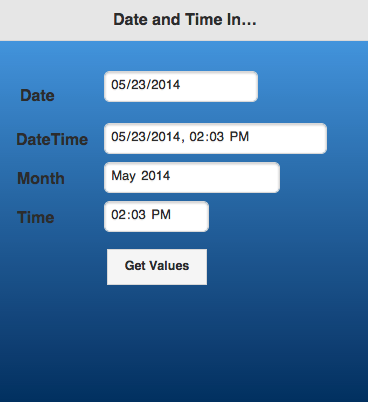Form
Description
Forms act as containers for controls. To go to a new form, use the ChangeForm() function.
To add a Form to your app, choose Add Form from the Project menu at the top of the screen. Forms can be deleted in the Project Explorer.
Scrolling forms are allowed, with a couple of notes. Footerbars won't work (since the bottom needs to scroll up), nor will scrolling controls (which confuse the scroller).
The information on a form can be submitted to a URL by using the Ajax function.
Properties
Standard properties are supported, plus:
| backgroundColor | Sets the form's background color. Can be a color name, #RRGGBB, rgb(R,G,B), or transparent. |
| backgroundImage | Sets the form's background pattern or image. Overrides the backgroundColor property.linear-gradient(#55aaee, #003366); url(http://www.nsbasic.com/images/eiffel.gif); |
| designHeight | Used to calculate height if expressed as a percentage. If 0, then same as height in pixels. Design time only. |
| designWidth | Used to calculate width if expressed as a percentage. If 0, then same as width in pixels. Design time only. |
| fullscreen | True/False. If True, the form will automatically fill the entire device screen. The IDE will still use height and width at design time. Design time only. |
| height | The height of the form in pixels or a percent of designHeight. |
| left | The left position of the form. Use this for forms that are not full screen. |
| locked | If set to true, the controls on the Design Screen cannot be moved |
| modal | If set to true, the form will be displayed centered on top of any other forms. Other forms will be grayed out and cannot be accessed until the form is hidden. Design time only. |
| language | The programming language used in the code for the form. Can be BASIC or JavaScript. Design time only. |
| openMode | Should the form be open at startup? Use this for forms which are to remain open. There is no need to set this for the first form of the project: that is set in Project Properties. Design time only. |
| parentForm | The name of the parent form. If blank, the main page (NSBPage) is used. Can be used to make a form a child of another control or form. |
| position | Determines how a form is positioned. Normally set to 'absolute': the form is positioned according to the left and top properties. If set to 'relative', Responsive Design principles apply. |
| script | Opens the Code Window for the form. |
| scroll_options | iScroll options. See iScroll docs at http://iscrolljs.com. |
| scrolling | Allow scrolling? Design time only. |
| setFocusID | The control to get the focus when the form is shown. |
| script | Opens the Code Window for the form. |
| style | The CSS style for the form. |
| width | The width of the form in pixels or percent of designWidtth. Percents can be set at runtime. |
| reset() | Clear all fields on the form. Runtime only. |
Events
Standard events are supported, plus:
| onhide() | Called when form hidden as a result of ChangeForm() |
| onkeypress(event) | Called when a key is tapped on a form. |
| onshow() | Called by firstform and when form is shown as a result of ChangeForm() |
| onsubmit() | Called when a form is submitted. |
Example (Basic)
Change color at runtime
Form1.style.backgroundColor="red" Form1.style.width="100%"
To prevent the image from repeating to fill the full window:
NSBPage.style.backgroundRepeat = "no-repeat"
Set gradient background at runtime:
Form1.style.backgroundImage="linear-gradient(#55aaee, #003366)"
Change the theme of a Form at runtime. Needs to be done each time you show a Form:
$("#NSBPage").page({theme: "a"})
Example (JavaScript)
Form1.style.backgroundColor="red"; Form1.style.width="100%";
To prevent the image from repeating to fill the full window:
NSBPage.style.backgroundRepeat = "no-repeat";
Set gradient background at runtime:
Form1.style.backgroundImage="linear-gradient(#55aaee, #003366)";
Change the theme of a Form at runtime. Needs to be done each time you show a Form:
$("#NSBPage").page({theme: "a"})
